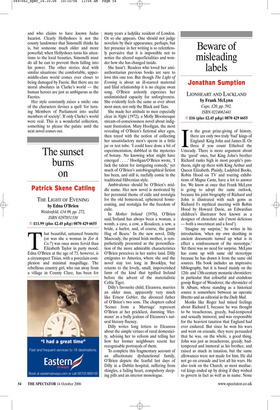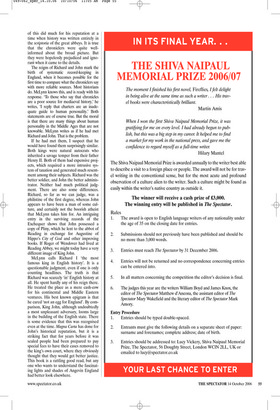Beware of misleading labels
Jonathan Sumption
LIONHEART AND LACKLAND by Frank McLynn Cape, £20, pp. 592, ISBN 0224062441 ✆ £16 (plus £2.45 p&p) 0870 429 6655 In the great prize-giving of history, there are only two truly ‘bad’ kings of England: King John and James II. Or three if you count Ethelred the Unready. There is more argument about the ‘good’ ones, but King John’s brother Richard ranks high in most people’s pantheon, right up there with King Arthur and Queen Elizabeth. Plainly, Ladybird Books, Robin Hood on TV and touring exhibitions of Magna Carta, have a lot to answer for. We know at once that Frank McLynn is going to adopt the same outlook, because his joint biography of Richard and John is illustrated with such gems as Richard I’s mythical meeting with Robin Hood by Howard Davie, an Edwardian children’s illustrator best known as a designer of chocolate ads (‘most delicious — both a sweetmeat and a food’).
‘Imagine my surprise,’ he writes in his introduction, ‘when my own sleuthing in ancient documents turned up what is in effect a reinforcement of the stereotype.’ Yet there was no need for surprise. McLynn has come up with same old stereotype because he has drawn it from the same old sources. His book includes an impressive bibliography, but it is based mainly on the 12thand 13th-century monastic chroniclers: in particular that colourful and credulous gossip Roger of Wendover, the chronicler of St Albans, whose standing as a historical source is somewhere between an operatic libretto and an editorial in the Daily Mail.
Monks like Roger had mixed feelings about Richard I, because he was thought to be treacherous, greedy, bad-tempered and sexually immoral, and was responsible for the heaviest taxation that England had ever endured. But since he won his wars and went on crusade, they were persuaded that he was, on the whole, a good thing. John was just as treacherous, greedy, badtempered and immoral as his brother, and raised as much in taxation, but the same allowances were not made for him. He did not go on crusade and lost all his wars. He also took on the Church, as most mediaeval kings ended up by doing if they wished to govern in fact as well as in name. None of this did much for his reputation at a time when history was written entirely in the scriptoria of the great abbeys. It is true that the chroniclers were quite wellinformed about the broad picture. But they were hopelessly prejudiced and ignorant when it came to the details.
The reigns of Richard and John mark the birth of systematic record-keeping in England, when it becomes possible for the first time to compare what the chroniclers say with more reliable sources. Most historians do. McLynn knows this, and is ready with his response. ‘To those who say that chronicles are a poor source for mediaeval history,’ he writes, ‘I reply that charters are an inadequate guide to human personality.’ Both statements are of course true. But the moral is that there are many things about human personality in the Middle Ages that are not knowable. McLynn writes as if he had met Richard and John. That is the problem.
If he had met them, I suspect that he would have found them surprisingly similar. Both kings were natural autocrats who inherited a savage temper from their father Henry II. Both of them had expensive projects, which required a more intrusive system of taxation and generated much resentment among their subjects. Richard was the better soldier, and John the better administrator. Neither had much political judgment. There are also some differences. Richard, so far as we can judge, was a philistine of the first degree, whereas John appears to have been a man of some culture, and certainly not the boorish atheist that McLynn takes him for. An intriguing entry in the surviving records of the Exchequer shows that John possessed a copy of Pliny, which he lent to the abbot of Reading in exchange for Augustine of Hippo’s City of God and other improving books. If Roger of Wendover had lived at Reading Abbey, we might today have a very different image of King John.
McLynn calls Richard I ‘the most famous king in English history’. It is a questionable judgment, even if one is only counting headlines. The truth is that Richard was scarcely ‘in’ English history at all. He spent hardly any of his reign there. He treated the place as a mere cash-cow for his continental and Middle Eastern ventures. His best known epigram is that he cared ‘not an egg for England’. By comparison, King John, although undoubtedly a most unpleasant adversary, looms large in the building of the English state. There is some evidence that this was recognised even at the time. Magna Carta has done for John’s historical reputation, but it is a striking fact that for years before it was sealed people had been prepared to pay special fees to have their cases removed to the king’s own court, where they obviously thought that they would get better justice. This book is a rattling good read, but any one who wants to understand the fascinating lights and shades of Angevin England had better look elsewhere.



































































































 Previous page
Previous page